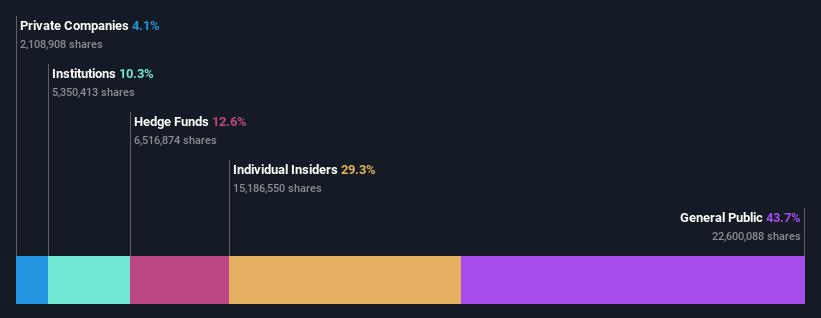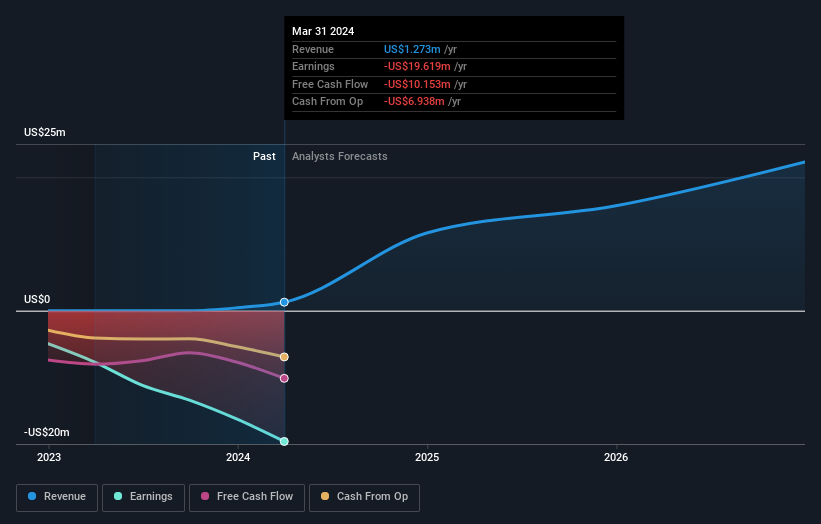While insiders own 29% of ASP Isotopes Inc. (NASDAQ:ASPI), retail investors are its largest shareholders with 44% ownership
Key Insights
Significant control over ASP Isotopes by retail investors implies that the general public has more power to influence management and governance-related decisions
A total of 11 investors have a majority stake in the company with 50% ownership
To get a sense of who is truly in control of ASP Isotopes Inc. (NASDAQ:ASPI), it is important to understand the ownership structure of the business. And the group that holds the biggest piece of the pie are retail investors with 44% ownership. Put another way, the group faces the maximum upside potential (or downside risk).
Individual insiders, on the other hand, account for 29% of the company's stockholders. Institutions often own shares in more established companies, while it's not unusual to see insiders own a fair bit of smaller companies.
Let's take a closer look to see what the different types of shareholders can tell us about ASP Isotopes.
Check out our latest analysis for ASP Isotopes
What Does The Institutional Ownership Tell Us About ASP Isotopes?
Many institutions measure their performance against an index that approximates the local market. So they usually pay more attention to companies that are included in major indices.
We can see that ASP Isotopes does have institutional investors; and they hold a good portion of the company's stock. This implies the analysts working for those institutions have looked at the stock and they like it. But just like anyone else, they could be wrong. When multiple institutions own a stock, there's always a risk that they are in a 'crowded trade'. When such a trade goes wrong, multiple parties may compete to sell stock fast. This risk is higher in a company without a history of growth. You can see ASP Isotopes' historic earnings and revenue below, but keep in mind there's always more to the story.
It would appear that 13% of ASP Isotopes shares are controlled by hedge funds. That catches my attention because hedge funds sometimes try to influence management, or bring about changes that will create near term value for shareholders. The company's largest shareholder is AK Jensen Investment Management Limited, with ownership of 13%. Meanwhile, the second and third largest shareholders, hold 12% and 7.4%, of the shares outstanding, respectively. Paul Mann, who is the second-largest shareholder, also happens to hold the title of Chief Executive Officer.
Looking at the shareholder registry, we can see that 50% of the ownership is controlled by the top 11 shareholders, meaning that no single shareholder has a majority interest in the ownership.
While it makes sense to study institutional ownership data for a company, it also makes sense to study analyst sentiments to know which way the wind is blowing. While there is some analyst coverage, the company is probably not widely covered. So it could gain more attention, down the track.
Insider Ownership Of ASP Isotopes
While the precise definition of an insider can be subjective, almost everyone considers board members to be insiders. The company management answer to the board and the latter should represent the interests of shareholders. Notably, sometimes top-level managers are on the board themselves.
Insider ownership is positive when it signals leadership are thinking like the true owners of the company. However, high insider ownership can also give immense power to a small group within the company. This can be negative in some circumstances.
Our most recent data indicates that insiders own a reasonable proportion of ASP Isotopes Inc.. Insiders have a US$46m stake in this US$158m business. This may suggest that the founders still own a lot of shares. You can click here to see if they have been buying or selling.
General Public Ownership
The general public-- including retail investors -- own 44% stake in the company, and hence can't easily be ignored. This size of ownership, while considerable, may not be enough to change company policy if the decision is not in sync with other large shareholders.
Private Company Ownership
We can see that Private Companies own 4.1%, of the shares on issue. Private companies may be related parties. Sometimes insiders have an interest in a public company through a holding in a private company, rather than in their own capacity as an individual. While it's hard to draw any broad stroke conclusions, it is worth noting as an area for further research.
Next Steps:
While it is well worth considering the different groups that own a company, there are other factors that are even more important. To that end, you should learn about the 4 warning signs we've spotted with ASP Isotopes (including 1 which is significant) .
Ultimately the future is most important. You can access this free report on analyst forecasts for the company.
NB: Figures in this article are calculated using data from the last twelve months, which refer to the 12-month period ending on the last date of the month the financial statement is dated. This may not be consistent with full year annual report figures.
Have feedback on this article? Concerned about the content? Get in touch with us directly. Alternatively, email editorial-team (at) simplywallst.com.
This article by Simply Wall St is general in nature. We provide commentary based on historical data and analyst forecasts only using an unbiased methodology and our articles are not intended to be financial advice. It does not constitute a recommendation to buy or sell any stock, and does not take account of your objectives, or your financial situation. We aim to bring you long-term focused analysis driven by fundamental data. Note that our analysis may not factor in the latest price-sensitive company announcements or qualitative material. Simply Wall St has no position in any stocks mentioned.
Have feedback on this article? Concerned about the content? Get in touch with us directly. Alternatively, email editorial-team@simplywallst.com

 Yahoo Finance
Yahoo Finance 

